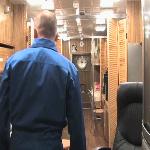
Six astronauts are about to experience what it's like to travel to Mars and back, only without actually leaving Earth. Three Russian astronauts will join three colleagues from other countries as they are locked up together for a year and a half on a simulated mission to the red planet. The mission is called Mars-500.
Three Russians, an Italian-Colombian, a Frenchman and a Chinese are making final preparations before spending 520 days inside a mock spaceship.
The Mars-500 mission at Moscow's Institute of Biomedical Problems will test the psychological and physical effects of long-term isolation on humans.
The crew's commander, engineer Alexei Sytev, looks at the three square meters that will be his personal space.
"This phone will work only for 11 days, when we are near the Earth, but it will be switched off later," said Sytev.
Sytev is a newlywed. He says leaving his wife is just one of the difficulties he's preparing for.
"I think the most difficult thing will be to be separated from the people that I am used to, and leaving behind some of the habits - all our activity will be directed towards a certain goal," he added. "I won't see sunsets, sunrises, won't feel rain for 18 months. That will be hard."
Each astronaut will be paid the equivalent of $100,000. They'll have two days off each week. They plan to conduct more than 100 scientific experiments, with their psychological and physiological data recorded throughout the mission.
After 250 days, three of the astronauts will simulate landing on the "Red Planet." The other three will wait for them -- in the mock spacecraft -- for a month. All communication with Earth will be via e-mail and will have as much as a 40-minute delay, like on a real Mars mission.
Alexander Suvorov is a physician. He and other scientists will monitor the astronauts.
"This experiment is unique because six people will be isolated for a long period of time and will work autonomously," noted Suvorov. "They will have to make decisions on their own and only then report to the Earth, and the Earth will tell them whether they did the right thing or not."
He says the experiment will pave the way for a real Mars expedition later this century.
"We are going to determine how much food and other products of daily use are needed, whether an international crew is compatible, how people of different cultures, of different training can find common language and work on performing their tasks," added Suvorov.
Mars-500 is the third in a series of interplanetary flight simulations. The earlier ones were shorter. The current experiment is set to end in November 2011.
(来源:VOA 编辑:陈丹妮)
